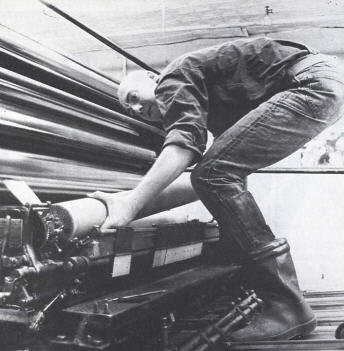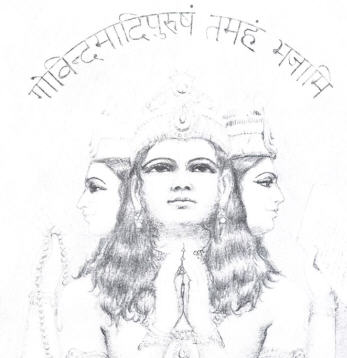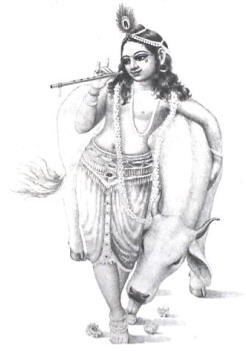vande rupa-sanatanau raghuyugau sri-jiva-gopalakau.
We are following in the footsteps of Lord Caitanya Mahaprabhu in order to understand Krsna consciousness. Krsna, the Supreme Personality of Godhead, is said in Sri Isopanisad to be very far away from us yet at the same time to be very near. Isvara,the supreme controller, is situated in everyone's heart, not only in the hearts of human beings, but also within the beasts, birds, aquatics, and even within the atoms themselves. We simply have not realized Him. Actually anyone, however, can find Krsna within his heart.
The process of finding Krsna is called yoga. There are many types of yoga. In the Western countries people are generally familiar with the process of hatha-yoga. This is an approved method and is described in the Sixth Chapter of Bhagavad-gita. At the present moment, however, people are short-lived, they are not very fortunate, and they are always disturbed by many external affairs, and therefore it is not possible to properly execute this hatha-yoga. Even five thousand years ago when Krsna advised His friend Arjuna to accept the hatha-yoga process, Arjuna said, "Krsna, this practice is impossible." He further said that to control the mind is as difficult as to control the wind. The mind flickers from one engagement to another and changes so swiftly that it is very difficult to control it in this age. Therefore Arjuna said that for him this process of hatha-yoga was not possible.
In order to encourage Arjuna, Krsna said that the yogi who always thinks of Him with love and faith is the topmost yogi. This Krsna consciousness movement is attempting to teach the people in general this process of Krsna consciousness, which is the topmost yoga. In order to succeed in this process, we have to accept the bona fide method for this age, and that is the chanting of the Hare Krsna mantra, as enjoined by Lord Caitanya: harer nama harer nama harer namaiva kevalam/ kalau nasty eva nasty eva nasty eva gatir anyatha. "Chant the holy name, chant the holy name, chant the holy name. In this age of Kali there is no other alternative, no other alternative, no other alternative for God realization."
Simple Truth

This age is called Kali-yuga. It began five thousand years ago, after the Battle of Kuruksetra, or after the death of Maharaja Pariksit. The full duration of Kali-yuga is 432,000 years, so there is a balance of 427,000 years facing us. As this age progresses, everything becomes degraded people's life span, memory and the quality of mercy become diminished. In the sastras it is pointed out that in this age people are very slow to engage in spiritual realization. This was apparent to me when I met a professor in Moscow whose claim was that with the annihilation of the body, everything is finished. At the present moment people have fallen into such a degraded state, into such ignorance, that they do not know the difference between spirit and matter. Even great philosophers and scientists, who claim to be very great leaders of society, have no knowledge of the spirit which exists beyond this body. Bhagavad-gita goes into considerable detail in its description of the body and soul, of the body and the owner of the body. The individual living entities are owners of these bodies, and they change bodies just as they change dress. This simple truth is practically unknown to modern civilized man. Contemporary civilization stresses the body only, and consequently this type of civilization is described as suicidal in Vedic literatures.
The living being evolves from aquatic life to plant life, to insect life, to animal life and to human life. Amongst human beings there are civilized and uncivilized forms. Those who are advanced in civilization should take advantage of their position by advancing in their spiritual consciousness, which means advancing in Krsna consciousness.
Originally we are all Krsna conscious because we are all part and parcel of Krsna, just as a finger is part and parcel of a body. The consciousness of the living entity is spread throughout the entire body, and according to Bhagavad-gita, that consciousness is indestructible. As long as the finger is attached to the body it has use and I will spend thousands of dollars in order to keep it, but as soon as that finger is detached, it is worth nothing. Similarly, when we are detached from the totality, Krsna, we are useless and have no value. As soon as we dovetail our desires to Krsna, then we have value. That is real life bhakti-yoga.
The Spiritual World
Bhakti may be defined as devotional service. When one renders devotional service he becomes free from all designations. One may be born an American, an African, an Indian or whatever, but on the absolute platform of rendering service to Krsna, devoting the senses to engagement in the work of Krsna, and spreading Krsna's message through this society for Krsna consciousness, one can transcend all these designations of nationality, birth, species, etc.
In working for Krsna the individual living entity forgets his designation, which in actuality only belongs to the body. Devotees of Krsna only think of themselves as servants of Krsna and consider themselves in different categories of servitude. Someone may write for Krsna, or paint for Krsna, or wash dishes for Krsna whatever the activity is, the purpose is satisfaction of Krsna, and therefore all engagements are on the same platform. In this way when one works in Krsna consciousness he can become free from all designations.
This may sound very difficult, but Krsna, who is sitting in everyone's heart, will give the living entity all facility as soon as He sees that the person is sincere. Krsna is the Supreme, and if He likes He can give the living entity whatever he desires. The goal should be to become a sincere servitor of Krsna, and if we sincerely desire this position, Krsna will grant it to us. In Bhagavad-gita Krsna enjoins Arjuna and all men to engage in His service, to abandon all other engagements and simply surrender unto Him. Krsna then vows to take charge of the living entity and give him all protection. We all suffer from our sinful activities, but Krsna assures us that He will protect those who are devoted to Him from the resultant actions of their sinful activities. Except for those who are devoted to serving Krsna, everyone is engaged in sinful activities more or less. That is a fact. Consequently in the material world there are so many varieties of bodies, so many species of life. In Vaikuntha, the kingdom of God, there is only one variety of living entity the four-handed Narayana form of the Lord. Everyone is a servant of Narayana or God, but everyone in His transcendental abode has the same features the features of God. In our present position we cannot understand what the situation is in the Vaikunthas, the transcendental world, but it is surely different from what we experience here. The Bhagavad-gita gives some hint of what the Vaikunthas are like there is no need of sunlight, moonlight or electricity because everything is illumined by the effulgence of the Almighty.
Beyond this manifested and unmanifested material nature there is another nature, which is called sanatana, or eternal. Everything in this material world has a certain date of birth or manifestation, a certain duration of life everything grows, gets old, dwindles and then vanishes. In the spiritual world there is no question of birth, death, growth or diminution or death. Everything there is eternal. We get information about the spiritual world from Krsna via Vedic literature or from His line of disciplic succession. There are many differences between the material and spiritual worlds, but the primary difference is that the material world is temporary and the spiritual world is eternal. Therefore if we want eternal, blissful life, full of knowledge, we must take to this Krsna consciousness process. It is recommended by the great sages, by the disciplic succession stemming from Lord Caitanya Mahaprabhu and from Lord Sri Krsna Himself in Bhagavad-gita.
Wonderful Krsna

Lord Brahma, the first in the line of disciplic succession, concluded each verse of his Brahma-samhita with the words govindam adi-purusam tam aham bhajami, which translates as "I worship Govinda, the primeval Lord." Similarly, in themahamantra, we repeat the words Hare Krsna, Hare Krsna, Krsna Krsna, Hare Hare/ Hare Rama, Hare Rama, Rama Rama, Hare Hare.
What is the purpose of this repetition? The more we repeat, the more we learn to love. That is required. We cannot repeat that which we do not love, for it will soon become disgusting. If we take any word and repeat it over and over again, we will soon become disgusted with it. Sometimes those who are not in the disciplic succession feel that this repetition of Hare Krsna is hackneyed and disgusting. This is because they have not developed a love of Krsna. Rupa Gosvami says, "Of what use is this one tongue, and what do I expect to hear with two ears only? If I only had billions of tongues, then I would be able to chant a little of the glories of the Supreme Lord." Rupa Gosvami and other great acaryas feel this way about the holy names of Krsna because they have love for Krsna. They taste the nectar of chanting and so cannot give it up. Even in the material world, when we love a person, we will repeat his name over and over. The real point is that this love should be developed for Krsna. In Vrndavana, Nanda Maharaja, Mother Yasoda, Radharani, the gopis and the cowherd men and boys and even the calves, trees and cows all love Krsna. They do not know that Krsna is God, and when Krsna does something wonderful, they simply take Him to be a wonderful child or boy. Yet despite this the inhabitants of Vrndavana do not know anything but Krsna. That is because of their love for Him. That is what is wanted in this present society. We should not be bogged down with so much philosophy, debating whether Krsna is God or not, whether the symptoms of God are there or not. The inhabitants of Vrndavana did not care for any of this. As far as they were concerned, be Krsna a God or man or whatever, they simply loved Him. That is the standard to which we must aspire. We have to increase our love for Krsna by engaging in His service. When one does service to Him, his love naturally develops. Lord Caitanya Mahaprabhu said that prema, love for Krsna, love for God, is the highest achievement in human life. This should not be confused with religion or religiosity, for they are different. Generally people go to a church or temple with some material purpose, asking God to give daily bread. Of course to go to God to pray for something material is better than not going at all. In the Communist countries, for instance, they say, "Why should we go to God at all? We shall create bread." Thus propaganda to make people godless is waged. But our relationship with God is permanent, and it is not possible to artificially erase it. Being atheistical, not believing in God, is simply an artificial and temporary state for the living entity. When a godless person is actually in danger, he thinks of God. It is not natural for the living entity to remain godless, for loving God is the natural life for the living entity.
Freedom to Choose

People are very fond of claiming to be free, and in the name of freedom they are prepared to have sex in the street. Such illusioned living entities do not know that there is no freedom at all as long as we are under the grip of material nature. One may claim to have freedom, but nature will soon contradict this claim. We are all conditioned, and we are simply thinking that we have freedom, yet this is all illusion. No one wants to die, and yet no one is free from death. No one wants to become old, yet no one is free from old age unless he dies young. No one wants to be in bondage to sexual desires, but the desires keep up, even in old age, for old men and old women try to remain young by cosmetic help. One would like to be free and to remain good-looking, but where is that freedom? Nature forces one to become old and wrinkled. So actually there is no freedom; freedom in this material world is simply false. No one wants to die, but death is certain. No one wants to become old, but old age is certain. No one wants to get sick, but disease is certain. At a higher stage, the living entity does not even want to take birth, but according to Bhagavad-gita birth is also certain. One cannot be free to stop death or birth unless he comes to Krsna consciousness.
Unless one comes to the position of love of Krsna, there is no question of freedom. That is nature's law. In our present state of illusion we have forgotten Krsna, and instead of loving Him we have developed a love for the things of material nature. This is symptomized in love of dog instead of love of God. In America there is a popular saying to the effect that a dog is man's best friend. In Bhagavad-gita Krsna says that He, God, is the friend and well-wisher of all living entities, but those in forgetfulness of Krsna have replaced God's position with the dog's position. The living entity thinks that he will be free from love of God by embracing material nature, but actually he is trapped into loving a dog. That is nature. Indeed, it is our nature to love something. There is no freedom, therefore. If we do not love Krsna, we will then be forced to love dog. We do have freedom, however, to make the choice, to choose the object of our love.
The human form of life in particular is meant for inquiring after the Absolute Truth. Currently it has become fashionable to glide down into animal life. When one becomes degraded or slides down to animalistic living, he cannot understand the Absolute Truth. At the present moment human society has become thus degraded. In the course of the evolutionary process, material nature gives the living entity the chance to come out of her clutches.
Devotion Beyond Death
Nature, or material energy, has clasped us very tightly and is loathe to let us get away, yet she gives us another chance in the human form of life. The unfortunate fact is that although trapped in material nature, the living entity does not consider himself trapped. Consequently, Yudhisthira Maharaja, upon being asked what the most wonderful thing in the world was, replied, "Every moment thousands of living entities are being delivered into the hands of cruel death, but those who are alive are thinking, 'I shall not die.' " Thus everyone is thinking that he has a permanent settlement. What could be more wonderful than this in the face of a changing universe? Everyone knows that death is sure everyone sees his friends, parents and relations dying but he is at the same time thinking, "I will live a long time." This is nature. The actual fact is that the living entity thinks that he will not die because by nature he is eternal. Unfortunately he has lost his spiritual identity and in the material entanglement, in the body, will be forced to undergo the death of the material body. Bhagavad-gita, however, describes the living entity as separate from the body and not dissolving with the body at death.
The process of gaining real freedom from the body and from the miseries of the body, which ultimately result in death, is this process of Krsna consciousness. In Bhagavad-gita Krsna says that His devotee never perishes. At death, the living entity who has devoted his life to Krsna does not have to return to the cycle of birth and death, as Krsna promises innumerable times in Bhagarad-gita and as the sages remark throughout the Vedic literatures. The conclusion then is that real freedom is in Krsna consciousness, in the realization of one's real identity as a functioning part of the Supreme Whole. Once that identity is realized, the living entity will not have to undergo the frustration of being lost in a world of death and ignorance. By the rendering of devotional service, he is catapulted out of the darkness of the material world into the light of Krsna's effulgence.
